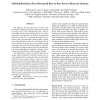Free Online Productivity Tools
i2Speak
i2Symbol
i2OCR
iTex2Img
iWeb2Print
iWeb2Shot
i2Type
iPdf2Split
iPdf2Merge
i2Bopomofo
i2Arabic
i2Style
i2Image
i2PDF
iLatex2Rtf
Sci2ools
107
click to vote
SRDS
2008
IEEE
2008
IEEE
Self-Stabilization in Tree-Structured Peer-to-Peer Service Discovery Systems
The efficiency of service discovery is critical in the development of fully decentralized middleware intended to manage large scale computational grids. This demand influenced the design of many peer-to-peer based approaches. The ability to cope with the expressiveness of the service discovery was behind the design of a new kind of overlay structures that is based on tries, or prefix trees. Although these overlays are well designed, one of their weaknesses is the lack of any concrete fault tolerant mechanism, especially in dynamic platforms; the faults are handled by using preventive and costly mechanisms, e.g., using a high degree of replication. Moreover, those systems cannot handle any arbitrary transient failure. Self-stabilization, which is an efficient approach to design reliable solutions for dynamic systems, was recently suggested to be a good alternative to inject faulttolerance in peer-to-peer systems. However, most of the previous research on self-stabilization in tree ...
Distributed And Parallel Computing | Peer-to-peer Based Approaches | Prefix Trees | Service Discovery | SRDS 2008 |
| Added | 01 Jun 2010 |
| Updated | 01 Jun 2010 |
| Type | Conference |
| Year | 2008 |
| Where | SRDS |
| Authors | Eddy Caron, Ajoy Kumar Datta, Franck Petit, Cédric Tedeschi |
Comments (0)

